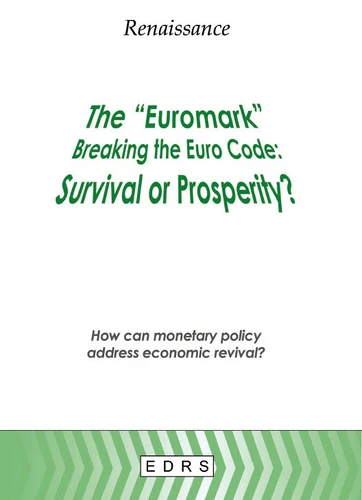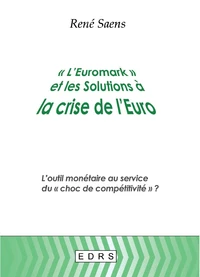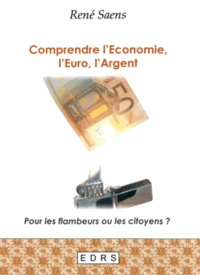The Euromark, Breaking the Euro Code ; Survival or Prosperity ?. How can monetary policy address economic revival ?
Par :Formats :
- Paiement en ligne :
- Livraison à domicile ou en point Mondial Relay indisponible
- Retrait Click and Collect en magasin gratuit
- Réservation en ligne avec paiement en magasin :
- Indisponible pour réserver et payer en magasin
- Nombre de pages152
- PrésentationBroché
- Poids0.2 kg
- Dimensions15,0 cm × 21,0 cm × 1,1 cm
- ISBN978-2-84930-050-3
- EAN9782849300503
- Date de parution01/06/2014
- CollectionSavoirs - Economie et Société
- ÉditeurEDRS
Résumé
With the outbreak of the financial crisis of 2008, France and the European countries have entered a zone of severe turbulence. Today, our economies seem even more threatened, since the necessary corrective steps have not been taken on time by politicians, most often due to a lack of economic competence. Newspapers and media do not maintain the desirable level of analysis either. They continue to prefer polemics, leaving aside pedagogical development.
Finally, the lack of imagination and blockages from the trade union (employers and employees) bring down an economic thinking, inherited from a bygone era. The crisis has pursued its chaotic journey from 2008 until 2013. Is it over ? No. It is still ahead of us ! Actually, the word crisis doesn't seem to be the most appropriate term. What should it be ? It is more like a set of Russian dolls hidden in each successive picture.
We have to analyze and adapt. The fact is that it is not so much the Euro which suffers than the countries of the Eurozone. Let us finally broaden our minds to this reality ! Within this context, what should one think about the "competitiveness shock" which stirs successive governments ? Will elected politicians continue to promote bureaucratic systems and gasworks, or pure nonsense for naïve or gullible people waiting for recovery from an economic Messiah or a providential bank governor ? For Europe, isn't it urgent to get involved in an economic and monetary policy to stimulate the economy ? Let us progress methodically.
Before answering or suggesting an alternative (Part 2), let's take the time to understand the mechanisms which are at work (Part 1).
Finally, the lack of imagination and blockages from the trade union (employers and employees) bring down an economic thinking, inherited from a bygone era. The crisis has pursued its chaotic journey from 2008 until 2013. Is it over ? No. It is still ahead of us ! Actually, the word crisis doesn't seem to be the most appropriate term. What should it be ? It is more like a set of Russian dolls hidden in each successive picture.
We have to analyze and adapt. The fact is that it is not so much the Euro which suffers than the countries of the Eurozone. Let us finally broaden our minds to this reality ! Within this context, what should one think about the "competitiveness shock" which stirs successive governments ? Will elected politicians continue to promote bureaucratic systems and gasworks, or pure nonsense for naïve or gullible people waiting for recovery from an economic Messiah or a providential bank governor ? For Europe, isn't it urgent to get involved in an economic and monetary policy to stimulate the economy ? Let us progress methodically.
Before answering or suggesting an alternative (Part 2), let's take the time to understand the mechanisms which are at work (Part 1).
With the outbreak of the financial crisis of 2008, France and the European countries have entered a zone of severe turbulence. Today, our economies seem even more threatened, since the necessary corrective steps have not been taken on time by politicians, most often due to a lack of economic competence. Newspapers and media do not maintain the desirable level of analysis either. They continue to prefer polemics, leaving aside pedagogical development.
Finally, the lack of imagination and blockages from the trade union (employers and employees) bring down an economic thinking, inherited from a bygone era. The crisis has pursued its chaotic journey from 2008 until 2013. Is it over ? No. It is still ahead of us ! Actually, the word crisis doesn't seem to be the most appropriate term. What should it be ? It is more like a set of Russian dolls hidden in each successive picture.
We have to analyze and adapt. The fact is that it is not so much the Euro which suffers than the countries of the Eurozone. Let us finally broaden our minds to this reality ! Within this context, what should one think about the "competitiveness shock" which stirs successive governments ? Will elected politicians continue to promote bureaucratic systems and gasworks, or pure nonsense for naïve or gullible people waiting for recovery from an economic Messiah or a providential bank governor ? For Europe, isn't it urgent to get involved in an economic and monetary policy to stimulate the economy ? Let us progress methodically.
Before answering or suggesting an alternative (Part 2), let's take the time to understand the mechanisms which are at work (Part 1).
Finally, the lack of imagination and blockages from the trade union (employers and employees) bring down an economic thinking, inherited from a bygone era. The crisis has pursued its chaotic journey from 2008 until 2013. Is it over ? No. It is still ahead of us ! Actually, the word crisis doesn't seem to be the most appropriate term. What should it be ? It is more like a set of Russian dolls hidden in each successive picture.
We have to analyze and adapt. The fact is that it is not so much the Euro which suffers than the countries of the Eurozone. Let us finally broaden our minds to this reality ! Within this context, what should one think about the "competitiveness shock" which stirs successive governments ? Will elected politicians continue to promote bureaucratic systems and gasworks, or pure nonsense for naïve or gullible people waiting for recovery from an economic Messiah or a providential bank governor ? For Europe, isn't it urgent to get involved in an economic and monetary policy to stimulate the economy ? Let us progress methodically.
Before answering or suggesting an alternative (Part 2), let's take the time to understand the mechanisms which are at work (Part 1).




